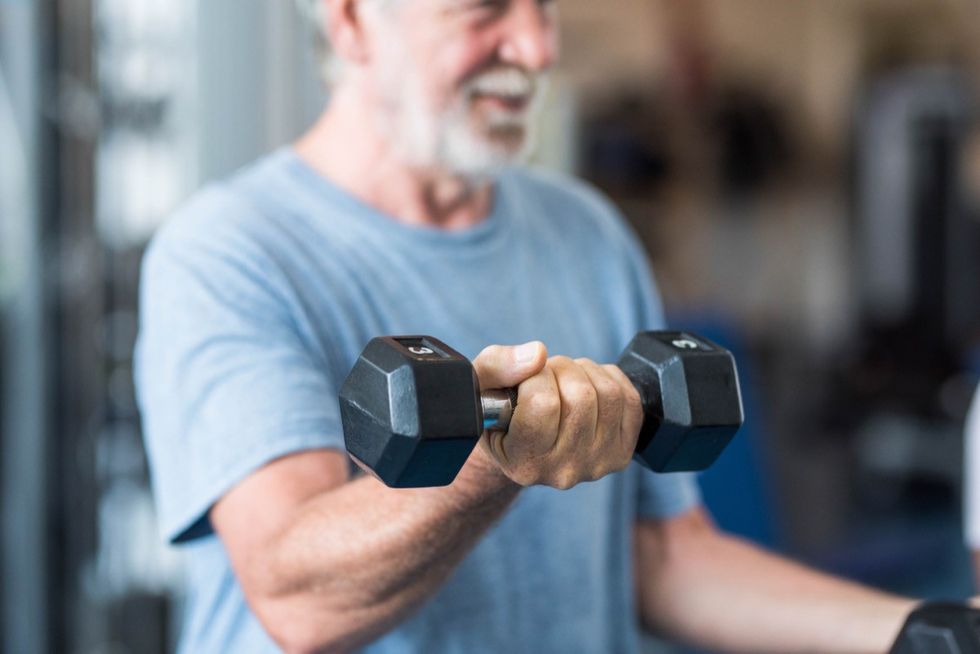Don’t wait for your joints to start hurting before taking care of them—while joint issues are common with age, certainly lifestyle changes and habits can make a substantial difference. “It’s a circular approach in some ways. By keeping your joints healthy with an active lifestyle and continuing to stay active throughout your life, it sets you up to continue these activities that you love later on — whether it’s walking, running or other sports,” orthopedic surgeon Robert Molloy, MD, tells the Cleveland Clinic. Here are the best ways to prevent stiff joints, according to experts.
RELATED: Experts Reveal Best Habit for Maintaining Healthy Joints.
Move It Or Lose It
Shutterstock
Exercise is one of the most effective ways to protect your joints and prevent stiffness. “Exercise strengthens the muscles, ligaments and tendons surrounding the joints,” Susan Sterling, former director of education at the Cooper Institute, tells the Arthritis Foundation. “When these tissues are strong, they act like a brace to protect the joint.”
Stay Hydrated

Drink plenty of water to protect your joints. “We certainly know that keeping the cartilage well hydrated is one of the best ways to keep it healthy,” Dominic King, a sports medicine physician and director of clinical transformation at Cleveland Clinic’s Orthopaedic & Rheumatologic Institute, tells AARP. “Well-hydrated tendons, well-hydrated ligaments, well-hydrated muscles are less likely to get injured.”
Exercise For Joint Health

Low-impact, strength-building exercises are best for strong joints. “The key to a successful exercise program is variety,” physical therapist Gary Calabrese, PT, DPT, tells the Cleveland Clinic. “Completing a balance of aerobic, muscle strengthening and flexibility exercises, along with keeping a healthy weight, will provide the base for good joint health for a lifetime.”
Healthy Weight
Shutterstock
Maintaining a healthy weight is important for joint health. “Many people often stop moving the minute something hurts or when they start aging,” says Thomas F. Saylor, MD. “This usually occurs because they fear the pain will worsen or that they’ll hurt themselves. In reality, physical activity is one of the best things you can do for your body, especially your joints. Regular exercise can not only ease joint stiffness and pain, but it can also strengthen the muscles supporting your joints. Plus, physical activity plays an essential role in reaching and maintaining a healthy weight.”
Healthy Diet

A healthy, nutritious, anti-inflammatory diet is key for helping to prevent stiff joints. “While there is no specific diet that people with rheumatoid and other inflammatory forms of arthritis should follow, researchers have identified certain foods that may help control inflammation, which can lead to pain. Many of them are found in the so-called Mediterranean diet, which emphasizes fish, vegetables and olive oil, among other staples,” says the Arthritis Foundation.
Don’t Forget To Stretch
Shutterstock
Stretching is good for the joints and can help prevent injuries. “Warming up and cooling down will help protect your heart and your joints,” says Harvard Health. “Stretching exercises, good shoes, and good technique will also reduce your risk of musculoskeletal injuries. With these simple precautions and a dose of common sense, exercise will be safe for your joints.”
Start Slow and Steady

People who are just starting their fitness journey should build up their endurance and strength. “In the past, older people just accepted joint pain,” says Mayo Clinic orthopedic surgeonJoaquin Sanchez-Sotelo, MD, PhD. “Now people are living longer and want to remain active as they age. We are not all destined for joint replacement. There are some people in their 80s and 90s who have great joints… You have to exercise within reason. Find that point where your muscles are healthy, flexible, strong and will protect the joints, but don’t overdo it.”



